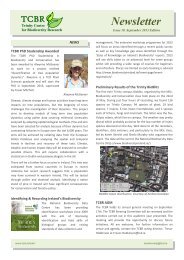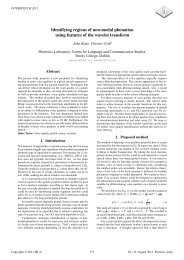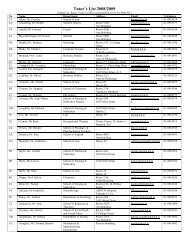Globalization and Inequality - Trinity College Dublin
Globalization and Inequality - Trinity College Dublin
Globalization and Inequality - Trinity College Dublin
Create successful ePaper yourself
Turn your PDF publications into a flip-book with our unique Google optimized e-Paper software.
inequality overall (Kanbur 1999).<br />
Thus far, the discussion has assumed that the only factors influencing the impact of<br />
globalization on inequality are countries’ endowments <strong>and</strong> their technology. There is another crucial<br />
factor, however, which should be mentioned: the distribution of those endowments among a<br />
country’s citizens. Take for example a positive trade shock in a l<strong>and</strong>-abundant country, which raises<br />
the returns to l<strong>and</strong>. Clearly, if l<strong>and</strong> holdings are concentrated among a few large l<strong>and</strong>-owners, this<br />
shock is likely to be a force for greater inequality. On the other h<strong>and</strong>, if the l<strong>and</strong> belonged<br />
exclusively to poor peasant proprietors, such a shock might well imply greater equality. The fact that<br />
trade theory implies a link between globalization <strong>and</strong> factor prices, rather than inequality per se, with<br />
the distribution of endowments intervening between the two, is one of the problems facing applied<br />
researchers seeking to explain the behaviour of summary inequality measures such as the Gini<br />
coefficient.<br />
In conclusion: the links between globalization <strong>and</strong> within-country income distribution are<br />
ambiguous. First, globalization affects factor prices differently in different countries, for st<strong>and</strong>ard<br />
Heckscher-Ohlin reasons. Second, different dimensions of globalization (e.g. trade versus factor<br />
flows) may have different implications for factor prices in a given country. Third, a given dimension<br />
of globalization (e.g. capital flows) may have ambiguous effects on factor prices in a given country,<br />
depending inter alia on patterns of complementarity or substitutability between factors of<br />
production. Finally, a given impact on factor prices can have different effects on inequality,<br />
depending on the distribution of endowments across individuals.<br />
Ultimately, these are issues which can only be resolved empirically.<br />
4
















